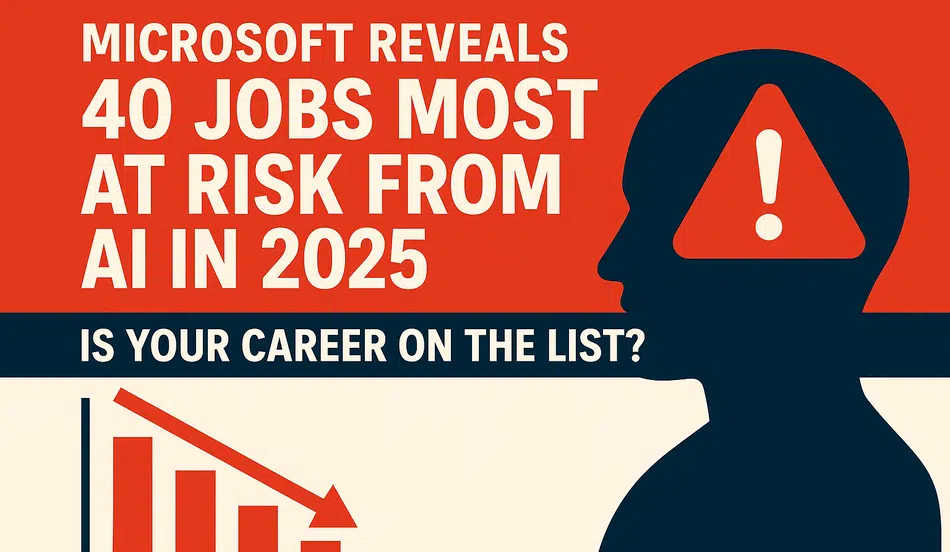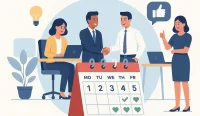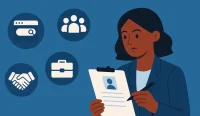A sweeping new report from Microsoft Research identifies which jobs are most exposed to artificial intelligence — and which roles are safer from automation. With AI tools like Copilot reshaping workplaces globally, the question looms: is your career resilient or at risk?
AI vs. Human Jobs: The Latest Insights from Microsoft
Microsoft’s 2025 study on AI job applicability has sparked fresh debates on automation, workforce transformation, and future employability. The report analyzed over 200,000 real-world interactions with AI tools like Microsoft 365 Copilot to identify where AI capabilities overlap most with human job functions.
The result? A list of 40 jobs highly exposed to AI disruption, alongside 40 roles relatively shielded from it.
While the study doesn’t claim these roles will vanish overnight, it raises urgent questions about job evolution, reskilling, and the long-term partnership between humans and machines.
The 40 Jobs Most Exposed to AI
According to the Microsoft AI research team, the following roles show the highest AI applicability—meaning they involve tasks that generative AI tools can already perform well:
- Writers and Authors
- Interpreters and Translators
- Historians
- Public Relations Specialists
- Technical Writers
- Customer Service Representatives
- Sales Representatives (Services)
- Editors, Proofreaders, Copywriters
- Web Developers
- Data Analysts
- Management Analysts
- Journalists
“The work of AI today heavily overlaps with language, data interpretation, and content synthesis,” said a lead researcher at Microsoft. “That’s why communication-heavy and knowledge work roles top the list.”
This insight reflects how tools like Microsoft Copilot, ChatGPT, and other generative AI models already handle writing, summarizing, replying to emails, generating content, and analyzing data—all once considered uniquely human tasks.
The 40 Jobs Least Affected by AI
On the flip side, the report highlights 40 jobs with low overlap with current AI capabilities. These are roles that require physical tasks, emotional intelligence, or real-time adaptability:
- Nursing Assistants
- Phlebotomists
- Massage Therapists
- Roofers
- Electricians
- Firefighters
- Cleaners and Housekeeping Staff
- Orderlies
- Machine Operators
- Truck Drivers
- Bridge Tenders
- Heavy Equipment Operators
“Physical labor, spatial awareness, and human touch remain difficult—if not impossible—for AI to replicate,” the report notes.
Future-Proof Your Career: Choose Roles AI Can’t Replace
Emotional intelligence, real-time adaptability, and the human touch still matter. Explore stable career paths in fields where AI falls short—like nursing, firefighting, trucking, and skilled trades.
Browse Human-Centered Jobs →These findings are consistent with long-standing automation research from institutions like McKinsey, the World Economic Forum, and Oxford University, all suggesting that manual and care-based professions will likely be among the last automated.
Who Should Be Worried?
If your job relies heavily on routine writing, documentation, customer interaction, or structured analysis, now is the time to assess how AI tools are changing your profession.
But “exposed” doesn’t mean “obsolete.” Microsoft clarified that their findings show where AI can assist, not necessarily replace:
“This study is not a prediction of job loss,” emphasized Microsoft. “It’s a map of how today’s AI aligns with tasks across professions.”
Even jobs listed as “at risk” may become hybrid roles—where AI tools serve as productivity partners, not replacements.
Real-World Impact: Microsoft’s Own Job Cuts
While Microsoft promotes AI as augmentative, it hasn’t shied away from AI-driven restructuring. In 2025 alone, the company laid off 15,000+ employees, with insiders citing AI efficiencies as a driving factor.
This contradiction is at the heart of the AI debate: AI as an enhancer vs. AI as a job killer.
Expert Outlook: How to Future-Proof Your Career from AI
Many experts believe AI disruption is real—but so is the opportunity to evolve.
Key strategies to stay ahead:
- Master AI Tools: Learn to use platforms like Microsoft Copilot, ChatGPT, and Midjourney to boost your daily output.
- Level Up Soft Skills: Creativity, empathy, leadership, and judgment are still AI-proof.
- Pivot to Human‑Centered Roles: Careers in ethics, AI oversight, HR, healthcare, and skilled trades remain highly human.
- Stay Agile: Embrace lifelong learning—what’s safe today may shift tomorrow.
“If you can’t be replaced by AI, you’ll be expected to work with it,” says tech ethicist Shalini Joshi.
The Reality Behind the Numbers
This isn’t the first AI job report, but it’s among the most grounded. Microsoft didn’t rely on speculation. They analyzed actual workplace data—from how real people use AI today.
That data-driven approach paints a clearer picture of how AI is shaping—not just threatening—modern employment.
Important distinction: While generative AI performs tasks like summarizing, scripting, and drafting at speed, it lacks true judgment, contextual empathy, and ethical reasoning—for now.
The Bottom Line
AI isn’t coming for your job tomorrow—but it is changing how your job is done today. Workers across all industries need to embrace digital fluency, reskilling, and a partnership mindset with AI.
Related Resources
- Microsoft’s full AI report (PDF)
- How Copilot is being used in real workplaces
- Explore jobs evolving with AI at WhatJobs
Frequently Asked Questions (FAQs)
Q1: Is Microsoft predicting these jobs will be eliminated?
A: No. Microsoft’s study shows where AI can currently assist, not where it will fully replace workers. The goal is augmentation, not elimination.
Q2: What industries are most affected by AI in 2025?
A: Media, customer service, sales, marketing, and administrative roles are most exposed due to the overlap with text-based and analytical tasks.
Q3: What careers are considered safe from AI?
A: Trades (electricians, plumbers), healthcare support (nurses, aides), and physical labor (cleaners, drivers) are currently least impacted.
Q4: Should I change careers if mine is listed?
A: Not necessarily. Instead, look for ways to integrate AI tools into your role and upskill in human strengths like creativity and decision-making.




